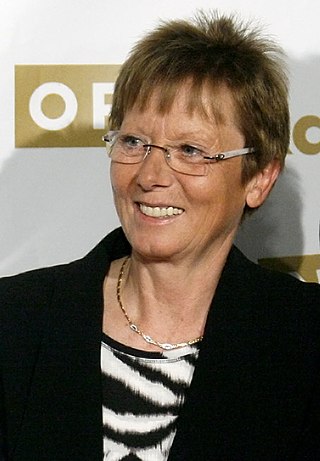
Annemarie Moser-Pröll is a former World Cup alpine ski racer from Austria. Born in Kleinarl, Salzburg, she was the most successful female alpine ski racer during the 1970s, with an all-time women's record of six overall titles, including five consecutively. She had most success in downhill, giant slalom and combined races. In 1980, her last year as a competitor, she secured her third Olympic medal at Lake Placid and won five World Cup races. Her younger sister Cornelia Pröll is also a former alpine Olympian.

The 47th World Cup season began on 27 October 2012, in Sölden, Austria, and concluded on 17 March 2013, at the World Cup finals in Lenzerheide, Switzerland. The overall titles were won by Marcel Hirscher of Austria and Tina Maze of Slovenia.

Mikaela Pauline Shiffrin is an American World Cup alpine skier who has the most World Cup wins of any alpine skier in history and is considered one of the greatest alpine skiers of all time. She is a two-time Olympic Gold Medalist. She is a five-time Overall World Cup champion, a four-time world champion in slalom and a seven-time winner of the World Cup discipline title in that event. Shiffrin is the youngest slalom champion in Olympic alpine skiing history, at 18 years and 345 days.

The International Ski Federation (FIS) Alpine Skiing World Cup is the premier circuit for alpine skiing competition. The inaugural FIS World Cup season launched 56 years ago in January 1967 and this 51st season began on 22 October 2016 in Sölden, Austria, and concluded in the United States at Aspen on 19 March 2017. The biennial World Championships interrupted the tour in early February in Saint Moritz, Switzerland. The season-ending finals in March were held in North America for the first time in two decades: the last finale in the U.S. was in 1997 at Vail.

The International Ski Federation (FIS) Alpine Ski World Cup was the premier circuit for alpine skiing competition. The inaugural season launched in January 1967, and the 2018–19 season marks the 53rd consecutive year for the FIS World Cup.
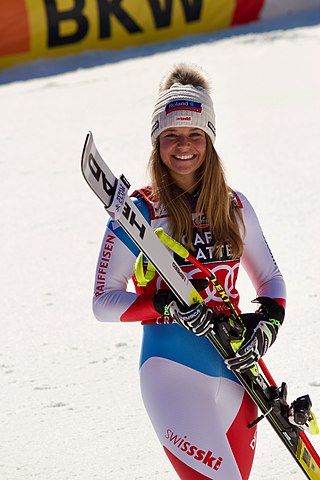
The women's super-G in the 2020 FIS Alpine Skiing World Cup involved 6 events, which produced six different winners from five different countries.

The women's giant slalom in the 2020 FIS Alpine Skiing World Cup involved 6 events. The season had been scheduled for nine events, but all of the last three giant slaloms were canceled.

The women's overall in the 2020 FIS Alpine Skiing World Cup involved 30 events in 6 disciplines: downhill (DH), Super-G (SG), giant slalom (GS), slalom (SL), Alpine combined (AC), and parallel (PAR). This was the first year that parallel was treated as a separate discipline; prior to the 2019–20 season, it had been a sub-element of the slalom discipline. The season had originally been scheduled to have 41 races, but 11 races that had originally been scheduled were canceled during the season, mostly due to the COVID-19 pandemic, as discussed below.

The women's overall in the 2022 FIS Alpine Skiing World Cup consisted of 37 events in 5 disciplines: downhill (DH), Super-G (SG), giant slalom (GS), slalom (SL), and parallel (PAR). The sixth discipline, Alpine combined (AC), had all of its events in the 2021–22 season cancelled due to the continuing schedule disruption cased by the COVID-19 pandemic, which also happened in 2020-21. In an adjustment that was partially motivated by the pandemic, each of the four main disciplines had nine races, while the parallel discipline had only one. The season did not have any cancellations.

The women's giant slalom in the 2023 FIS Alpine Skiing World Cup included ten events, including the final. The season was scheduled to open in Sölden, Austria on 22 October 2022, but the race was cancelled due to bad weather and rescheduled to Semmering, Austria on 27 December.
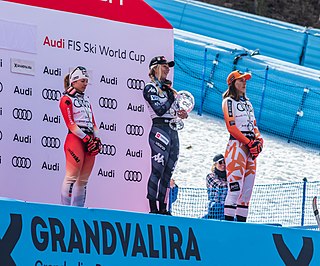
The women's overall competition in the 2023 FIS Alpine Skiing World Cup consisted of 38 events in four disciplines: downhill (DH), super-G (SG), giant slalom (GS), and slalom (SL). The fifth and sixth disciplines, parallel (PAR). and Alpine combined (AC), had all events in the 2022–23 season cancelled, either due to the schedule disruption cased by the COVID-19 pandemic (AC) or due to bad weather (PAR). The original schedule called for 42 races, but in addition to the parallel, two downhills and a super-G were cancelled during the season.

The women's overall in the 2019 FIS Alpine Skiing World Cup involved 35 events in 5 disciplines: downhill (DH), Super-G (SG), giant slalom (GS), slalom (SL) [which included parallel slaloms and city events], and Alpine combined (AC). After this season, city events were discontinued, and a new parallel discipline was created for parallel slaloms and parallel giant slaloms.
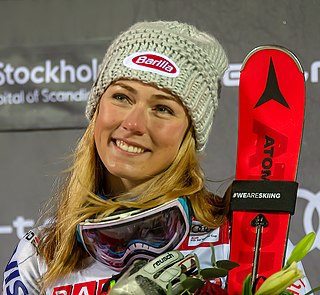
The women's super-G in the 2019 FIS Alpine Skiing World Cup involved 6 events, including the finals in Soldeu, Andorra. Originally, the season had been planned to hold 8 events, but the two races scheduled in Sochi, Russia were cancelled due to continuing heavy snowfall.

The women's giant slalom in the 2019 FIS Alpine Skiing World Cup involved 8 events.

The women's overall in the 2018 FIS Alpine Skiing World Cup involved 38 events in 5 disciplines: downhill (DH), Super-G (SG), giant slalom (GS), slalom (SL) [which included parallel slaloms and city events], and Alpine combined (AC).

The Women's Combined in the 2017 FIS Alpine Skiing World Cup involved three events, first a super-combined, and then two Alpine combined. Downhill champion Ilka Štuhec of Slovenia won the super-combined and held on to win the season championship. Interestingly, in only her second race in the combined discipline ever, overall World Cup champion Mikaela Shiffrin won the final race.
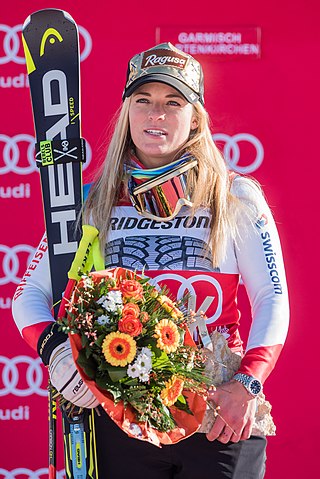
The women's overall competition in the 2016 FIS Alpine Skiing World Cup involved 40 events in 5 disciplines: downhill (DH), Super-G (SG), giant slalom (GS), slalom (SL), and Alpine combined (AC). A city event is a slalom conducted on a two-lane artificial ramp erected in a major city ; a super-combined consists of a downhill followed by a one-run slalom, as opposed to an Alpine combined, which consists of a Super-G followed by a one-run slalom.

The women's slalom competition in the 2016 FIS Alpine Skiing World Cup involved 11 events, including one parallel slalom and the season finale in St. Moritz, Switzerland.













